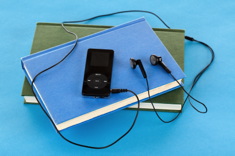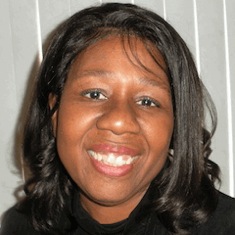A lanky boy in a hooded sweatshirt was sprawled across a beanbag chair in the back of the classroom. He was staring intently at the book in his hands. "Uh-oh," I thought, as I noticed the tiny earbuds tucked into his ears. "He is not reading at all. He's listening to music." Soon his teacher appeared and gently pulled the hood off his head. He took the earbuds out of his ears, clicked the player off, and he and his teacher engaged in a quiet conversation. The teacher went on to another student, and he put the earbuds back in. I wondered what was going on.
The literacy coach clued me in. This boy was participating in a book club and was finding the book a bit overwhelming. While he was able to read the book, it was difficult for him to maintain the same reading rate as the other students in the group. In a reading conference, the teacher tried to steer him toward another book, but he was determined to stick with the book club choice. So his teacher provided him with an audio version of the book and told him to follow along as the book was read to him.
In a future meeting with the coach, she reported that the audio book solution worked out well for that particular student in that situation. This wasn't the first time that I observed interesting uses of audio books in classrooms. In the past, audio books were strictly the domain of primary classrooms. Teachers would set up listening centers with an audio recording of a book and copies of the books. A small group of children would listen to the book through earphones. When the tape was over, they would complete a response. Here are some innovative ways that today's teachers are using audio books.
Take Home Teacher Read Aloud
Kathy was growing quite discouraged about her home reading program. Each day, her kindergarteners would check out a book from the class library. Their "homework" was to have someone read the book aloud to them. The next day, Kathy would confer with the children. Several children would consistently report that no one had read the book to them. Mommy had to work. Daddy was asleep. Grandma can't read English. Brother or sister had a lot of homework. Kathy did not want any of her students to miss out on a daily read aloud experience, so she decided to make audio recordings of some favorite books.
The teacher-made audio recordings were initially designed for those children who were having difficulty finding someone to read aloud to them at home. Soon, the word got out. Kindergarteners were bragging that they had a bedtime story read to them by none other than Miss Kenton! The other kindergartners began demanding to have a turn.
Kathy got busy making recordings of additional books. The new "teacher read aloud" program had some unexpected benefits. One child reported that his grandmother really enjoyed listening to a particular story and following along with the book. After a long weekend, this grandmother (who could not speak English) was able to read Where's Spot? to her grandson.
Another mother expressed her gratitude for the teacher-made audio books. This family has had lots of experience with audio books, and the mother reports that hearing Miss Kenton read a story is much better than listening to those recorded by Glenn Close or Kevin Costner. The professionally made tapes are more polished, but her daughter's connection to her teacher makes the teacher-made audio recordings a more satisfying experience.
Readers' Theater Support
One of the independent reading tasks in Alice's classroom is readers' theater. The teacher describes three to four books to be performed in class, and the children self select themselves into groups by expressing their preferences based on the teacher's descriptions. Each group is given a set of books. Although all of the books in the set contain the words corresponding to all of the roles, each one is uniquely marked with highlighter tape to indicate the words for a particular role. After the children in the group decide who will play each role, each child takes the book which highlights his or her designated role. The groups have a week to read and practice their readers' theater books. On Friday, each group gets to perform for the class. One Friday a group performed exceptionally well. Each of the readers read with almost artistic expression. Alice was very pleased, yet puzzled. That group included a couple of struggling readers, and the book they had performed was a bit challenging.
The mystery was solved at the end of the day as Alice was setting up the centers for the following week. When Alice went to change the books in the listening center, she found the audio recording for the book that the group had performed. Alice marveled at the children's ingenuity.
On the next Monday when she distributed the books for readers' theater, she included an audio recording of each of the books. Most of the groups took advantage of the extra support. The following Friday, the readers' theater performances showed a marked overall improvement.
Enhancing Multicultural Reading Experiences
One of my favorite series is The No.1 Ladies' Detective Agency by Alexander McCall Smith. I actually prefer to listen to these books rather than to read them. I love Lisette Lecat's voice. She beautifully pronounces the names and places in Botswana that absolutely baffle me. How would you pronounce "Mma Ramotswe"?
So I completely understand Susan's rationale for having her students listen to at least a chapter from any book that features cultures other than their own. She reports that it is a strategy that emerged out of necessity. Once she had a group of students who were struggling with the book Roll of Thunder, Hear My Cry. Susan discovered that the problem was that most of the dialogue in the book was written in dialect. After listening to a couple of chapters, the students had no trouble completing the book.
Susan said that using audio recordings to support the reading of multicultural literature also enriches the reading experience in several other useful ways besides helping the students deal with dialects. Some of the recordings include music and sound effects. When her students listened to Esperanza Rising, they heard traditional mariachi music. They also got support with the Spanish words used in the book.
Audio books mediate and scaffold students' reading experiences of books from other cultures. The benefits extend to other books featuring that culture.
From the Horse's Mouth
Marilyn reports that her class achieves deeper understanding during an author study when the author reads some of his or her own books to the class. While most audio book publishers hire an actor to make the audio recording for a book, sometimes the author personally makes the recording. Imagine hearing the story in the author's own voice! I remember hearing Eloise Greenfield read Honey, I Love. I had been reading it completely differently. Now I knew how Eloise meant for the poem to be read and heard.
Marilyn reports that her all-time favorite author in this context is Mem Fox. Marilyn doesn't use a traditional audio recording when her class listens to Mem Fox's books. She goes to Mem Fox's website www.memfox.com. There a lucky reader can access Mem's own renditions of three of her classic stories: Koala Lou, Tough Boris
, and Sleepy Bears
. Other authors that Marilyn's class has enjoyed are: Tomie de Paola (26 Fairmount Avenue)
, Arnold Lobel (The Frog and Toad series)
, and Mary Pope Osborne (The Magic Tree House Series)
.
Top Ten Audio Books
All audio books are not created equal. In my conversations with teachers about audio books, the same titles keep coming up again and again as exceptionally good ones. I am passing that list along to you. Enjoy!
The Watsons Go to Birmingham — 1963 by Christopher Paul Curtis read by Levar Burton.
The Tale of Despereaux by Kate DiCamillo, read by Graeme Malcolm.
Joyful Noise and I Am Phoenix
by Paul Fleischman, read by Melissa Hughes.
Lilly's Purple Plastic Purse by Kevin Henkes, read by Laura Hamilton.
Chicka Chicka Boom Boom by Bill Martin, Jr. and John Archambault, read by Ray Charles.
Junie B. Jones series by Barbara Park, read by Lana Quintal.
The Golden Compass by Philip Pullman, read by the author.
Harry Potter series by J.K. Rowling, read by Jim Dale.
A Series of Unfortunate Events series by Lemony Snicket, read by Tim Curry.
Locomotion by Jacqueline Woodson, read by Dion Graham.



